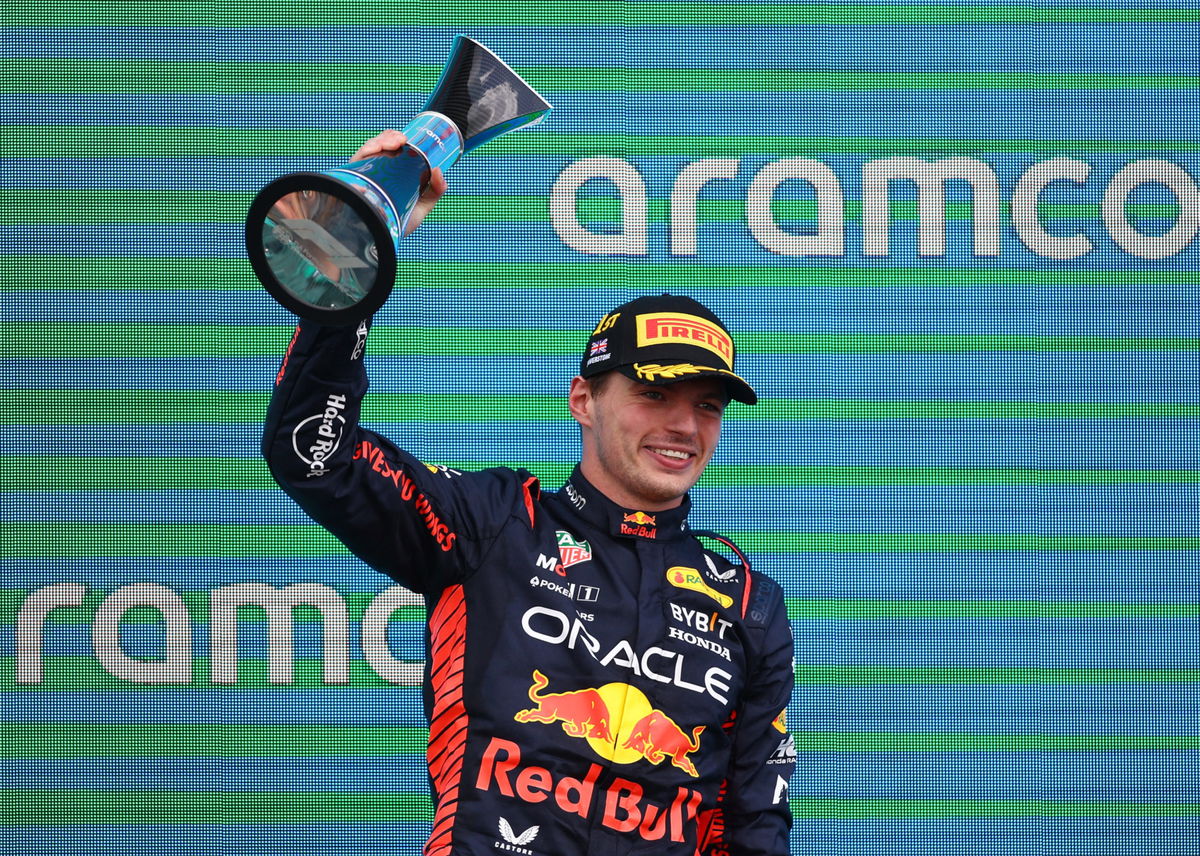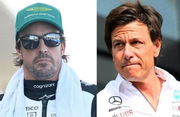
Reuters
Formula One F1 – British Grand Prix – Silverstone Circuit, Silverstone, Britain – July 9, 2023 Red Bull’s Max Verstappen celebrates with a trophy on the podium after winning the race REUTERS/Molly Darlington

Reuters
Formula One F1 – British Grand Prix – Silverstone Circuit, Silverstone, Britain – July 9, 2023 Red Bull’s Max Verstappen celebrates with a trophy on the podium after winning the race REUTERS/Molly Darlington
Sporting dominance is rarely ever good for anyone other than the person dominating. And in a sport like Formula 1, the only people who benefit from a driver like Max Verstappen dominating, are their team personnel. It’s not good for the sport, and it’s not good for business because, at some point or the other, people get bored of watching the same person win again and again. And that’s precisely what has led to the downfall of the Swedish streaming service, Viaplay.
Watch What’s Trending Now!
Max Verstappen and Red Bull have been on another level for the past two seasons since the FIA introduced the regulation changes in 2022. Watching them win every race possible with nothing too significant happening anywhere else on track—contrary to what Netflix’s Drive to Survive portrays—has become monotonous, especially for new fans who have never experienced a dominant era in F1 before. But when Viaplay bought F1 streaming rights in the Netherlands, it never expected it to fail there, considering Verstappen’s popularity and dominance. But it happened anyway.
ADVERTISEMENT
Viaplay follows Ziggo Sport and succumbs to Max Verstappen’s dominance
It’s not just F1 teams struggling to handle Max Verstappen in the RB19. F1 broadcasters are struggling too. Ziggo Sport, a Dutch broadcaster, gave up the rights to F1 in the Netherlands after the 2021 season. And it would’ve been a crime in the Netherlands not to have F1 broadcasts, especially after Verstappen won his first championship. Viaplay saw an opportunity and launched its streaming service there in 2022.

Reuters
Formula One F1 – British Grand Prix – Silverstone Circuit, Silverstone, Britain – July 9, 2023, Red Bull’s Max Verstappen celebrates with his team after winning the race REUTERS/Andrew Boyers TPX IMAGES OF THE DAY
What should’ve been a successful venture for the Swedish service has gone south. Chris Woerts, a sports marketer explained the situation speaking to the Dutch radio platform BNR, stating “Expansion abroad has been very disappointing. They have too little inflow of new subscribers and too high costs for the acquisition of content. That’s a deadly cocktail. The company has paid a record amount, about 30 to 35 million euros ($39 million) per year. That was a huge explosion of costs, and it’s very difficult to recoup.” [translated via Google]
ADVERTISEMENT
But why is it struggling in the Netherlands, of all places? As surprising as it may sound, Super Max’s dominance has caused subscriptions to decrease because the Dutch audience is “frugal.” Woerts explained, “As soon as the finish is in sight and Max [Verstappen] is world champion, people put it on pause en masse, and the number of subscribers decreases.”
Top Stories
Little Fan Makes “Super Important” Charles Leclerc Wish With a Promise to See Him at the Italian GP

Red Bull Could Descend Into a Ferrari-Like State & Here Is Why!

Fernando Alonso Deemed F1 2026 Champion as Honda Challenges Mercedes in Viral Tease

Zak Brown & McLaren Possibly in Deep Trouble as Mercedes Cuts Engine Supply for F1 2026

Who Are Lando Norris’s Parents? Meet Adam Norris and Cisca Wauman

ADVERTISEMENT
Last season, Verstappen won the championship at the Japanese GP with four races left. And considering how dominant he’s been this season, the championship could come sooner, affecting Viaplay even more than it already has. Now that Viaplay is giving up F1 rights, a former broadcaster might be interested in claiming them.
Ziggo Sport and Dutch F1 could be reunited
After the 2021 season, as reported by blackbookmotorsport.com, Ziggo Sport released a statement saying, “From 2022, Formula One will, unfortunately, move to another channel. We have proudly broadcasted Formula One for nine years. In those years, the rates for broadcasting rights have grown so much that it was unfortunately not possible for us to keep Formula One.” But according to Woerts, Ziggo Sport might look to reclaim streaming rights after a two-year break despite the price surge.
ADVERTISEMENT

Reuters
Formula One F1 – Japanese Grand Prix – Suzuka Circuit, Suzuka, Japan – October 9, 2022 Red Bull’s Max Verstappen waves ahead of the race REUTERS/Kim Kyung-Hoon
He said, “The rights will be back on the market in August of this year. Then it will become clear whether Viaplay retains the rights or whether they will go to another party, for example, the still very interested Ziggo Sport.”
Will Ziggo Sport be able to sustain this time around if it becomes the official Dutch F1 broadcaster?
ADVERTISEMENT
WATCH THIS STORY | Will Max Verstappen Retire Early from F1?
ADVERTISEMENT
ADVERTISEMENT
ADVERTISEMENT

